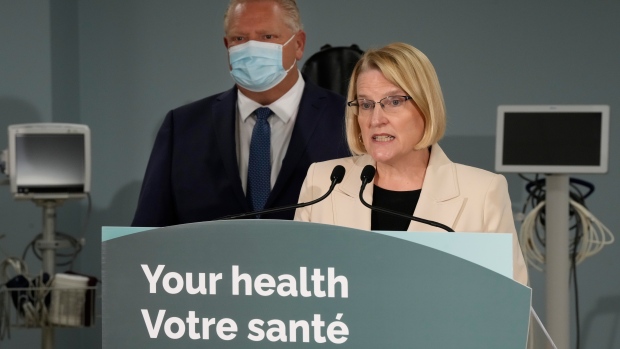‘Money bag up front:’ Rural Ontario residents step up incentives to attract medical workers
As small communities across Ontario struggle to hire doctors and nurses, one city has come up with a strategy that seems close to success: giving them a “money bag first.”
That’s the incentive being offered in Huntsville, Ont., where local officials say they’ll offer an $80,000 signing bonus to any family doctor who agrees to work in town for at least five years.
Other nations use similar tactics.
Blanche River Health in Kirkland Lake, a municipality in eastern Ontario, is offering $2,000 to anyone, anywhere in the world, who successfully refers a doctor or nurse to work at the hospital.
In Dryden, Ont., a remote town more than 1,700 kilometers northwest of Toronto, the long-term care facility is including $37,500 for help with relocation costs . Combined with separate provincial grants, doctors moving to Dryden can be awarded $155,000 for a four-year commitment.
Health experts warn that while these efforts make sense given the severe shortage of doctors facing Ontario, they risk creating a “Hunger Games”-style competition for the medical workforce. which puts more pressure on already cash-strapped municipalities.
Bob Stone is the local councilor who spearheaded Huntsville’s new bonus plan.
The project, approved by the council in May, hopes to attract 10 doctors.
Two months later, Stone said seven doctors have expressed interest and several are close to signing contracts.
He said: “It is already working, and we are very happy, and as soon as we have a signed contract, we will be telling the whole world.”
Stone explained that Huntsville faces an urgency to act. With the doctor’s waiting list growing longer, and several doctors on the job due to retirement, about a third of the city’s 21,000 residents are at risk of not having a doctor. of families, he said.
Under the terms approved by the court, any doctor who takes over the existing practice receives $60,000. Doctors who open a new practice are awarded $80,000. The money comes from the municipal budget, Stone said.
“We give them that bag of money in advance because that will be the incentive for them to move here,” he said, adding that the bonus is tied to a five-year commitment.
Jorge VanSlyke, president and CEO of Blanche River Health, which serves Kirkland Lake, said its community referral plan led to inquiries about the opportunities, but noted it was too early to tell if the program would be successful. you will work.
“You have to be someone that the successful candidate says is a referral source and we will contact you that way and we will provide an incentive,” VanSlyke said.
“Whether or not it will be successful is yet to be determined, but our goal now is that no stone will be left unturned when it comes to our recruitment efforts.”
Ian Culbert, executive director of the Canadian Public Health Association, said the increasing share of incentives to attract doctors puts communities deemed undesirable “in an impossible position.”
Although such programs have existed for decades in some rural and northern communities, they have grown noticeably since the pandemic.
“It’s a very negative influence as far as health equity goes. It creates an unsettled playing field and it comes from a sense of desperation,” Culbert said.
Culbert does not blame the public for giving bonuses, given the responsibility of providing health care to citizens.
But he argued that there are better ways to deal with the shortage of rural doctors, including student loan forgiveness tied to years of community service, or informing medical students of the benefits of rural work in part-time programs while in medical school.
He also said that the province should do more to solve the gaps caused by its health funds.
For the President of the Ontario Medical Association Dr. Dominik Nowak, the first step must be to address the general shortage of family doctors.
Nowak said one in five Ontarians does not have a family doctor, and soon it could be one in four. That shortage has caused a chain reaction that has seen fewer people receive early diagnosis for serious illnesses, ultimately putting greater pressure on hospitals.
“What this means to the community is that they are suffering,” he said.
Nowak supports several measures that he says will allow doctors to see more patients, including using administrative staff to reduce the paperwork burden, which currently takes up 19 hours a week.
He also supports a team care system, where nurses, pharmacists, physiotherapists and others work collaboratively to support doctors.
Nowak called for more provincial support to boost the number of doctors. He criticized bonus-based recruitment as “creating a Hunger Games style where communities have to compete for doctors and where communities recruit doctors from one community to another.”
Meanwhile, the incentive packages are getting better and better.
In the municipalities of Marmora and Lake, about 200 kilometers east of Toronto, doctors are offered houses and clinic space on the river front for a fee, among other incentives.
And in Huntsville, Stone said there’s more than just cash available: many restaurants have offered $500 gift certificates for incoming doctors, a car dealership is offering a free car for a year and the area The resort has included a free golf club membership.
Because Huntsville doesn’t want to steal doctors from its neighbors, doctors from within Muskoka and nearby municipalities aren’t eligible, but anywhere is fair game, Stone said.
He said: “Yes, it is competition, and we are doing what is best for our citizens.” And I’m sorry for others who have the same problems.
This report by The Canadian Press was first published on Aug. 5, 2024
#Money #bag #front #Rural #Ontario #residents #step #incentives #attract #medical #workers
